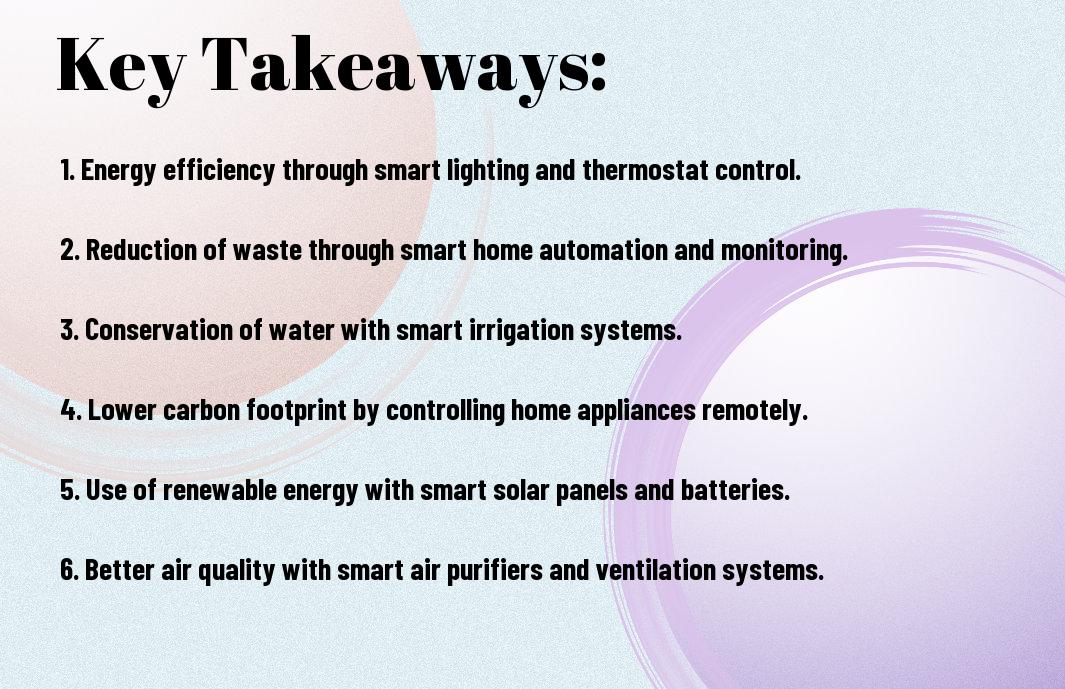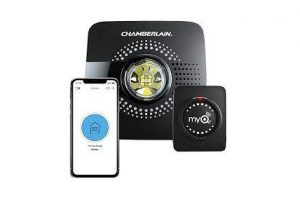Embrace the future of sustainable living by incorporating smart home gadgets into your everyday routine. These innovative devices are designed to reduce energy consumption, lower your carbon footprint, and promote a more eco-friendly lifestyle. From smart thermostats that regulate your home’s temperature to energy-efficient lighting and smart power strips that automatically turn off unused appliances, the possibilities are endless. By integrating these smart home solutions into your living space, you have the power to make a significant impact on the environment while enjoying the convenience and efficiency they offer. Join the movement towards a more sustainable future and explore how these gadgets can help you achieve a more environmentally-conscious lifestyle.
Key Takeaways:
- Energy efficiency: Smart home gadgets such as smart thermostats and energy-efficient lighting can help to reduce energy consumption, leading to a more environmentally-friendly lifestyle.
- Waste reduction: Smart refrigerators and other appliances with automated inventory tracking can help in reducing food waste by ensuring that items are used before they expire, contributing to a more eco-friendly lifestyle.
- Water conservation: Smart irrigation systems and water monitoring devices can help with efficient water usage, reducing water wastage and promoting an eco-conscious lifestyle.
- Remote monitoring and control: Smart home gadgets allow users to monitor and control their household devices remotely, enabling them to make more thoughtful and sustainable choices in their everyday lives.
- Reduced carbon footprint: By automating and optimising various aspects of home management, smart home gadgets can contribute to a reduced carbon footprint and a more environmentally-conscious way of living.
Energy Efficiency in Smart Homes
One of the key ways that smart home gadgets contribute to a more environmentally-conscious and eco-friendly lifestyle is through their energy efficiency. These devices are designed to help you reduce your energy consumption and ultimately lower your environmental impact, all while saving you money on your utility bills.
Smart Thermostats and Energy Consumption
Smart thermostats are a game changer when it comes to managing your energy usage. These devices learn your heating and cooling habits and adjust the temperature settings accordingly, ensuring that you’re not unnecessarily using energy when you’re not at home or when the weather doesn’t require it. By doing so, you can dramatically reduce your energy consumption and see a noticeable difference in your energy bills.
Intelligent Lighting Systems and Power Savings
Intelligent lighting systems are another essential part of an energy-efficient smart home. By using sensors and timers, these devices can automatically turn off lights when no one is in the room, adjust the brightness according to natural light levels, and even be controlled remotely through your smartphone. This level of control and automation not only saves you money on your electricity bills, but also reduces unnecessary power consumption and contributes to a more sustainable way of living.
Water Conservation Techniques
Water conservation is a crucial aspect of maintaining an environmentally-conscious lifestyle, and with the assistance of smart home gadgets, you can significantly reduce your water usage. By implementing various water-saving techniques, you can make a positive impact on the environment whilst also contributing to a more sustainable way of living.
Leak Detection with Smart Sensors
One of the most effective ways smart home gadgets can contribute to water conservation is through leak detection systems. Smart sensors installed in your plumbing infrastructure can detect even the slightest of leaks, which can often go unnoticed but can result in significant water wastage over time. These sensors alert you in real-time, allowing you to take immediate action to rectify the issue, preventing water wastage and potential damage to your home. Early detection of leaks can save you from costly repairs and excessive water wastage.
Smart Irrigation Systems for Sustainable Gardening
Smart irrigation systems are an excellent tool for maintaining a lush garden while minimising water usage. These systems are equipped with weather sensors and moisture detectors, allowing them to adjust the watering schedule based on real-time conditions. By accurately delivering the right amount of water to your plants, smart irrigation systems prevent over-watering and ensure optimal water usage for your garden. This not only saves water but also promotes healthier plant growth, contributing to a more sustainable approach to gardening.
Waste Reduction through Smart Devices
When it comes to reducing waste in your household, smart home gadgets can play a significant role in helping you achieve a more environmentally-conscious lifestyle. By utilising advanced technology, these devices can help you cut down on unnecessary waste, particularly in the kitchen and with recycling.
Smart Refrigerators to Reduce Food Waste
Smart refrigerators are equipped with features that help you keep track of the items in your fridge, their expiry dates, and even suggest recipes based on the ingredients you have. This can help you reduce food waste by ensuring that you use up all your ingredients before they go bad. By minimising food waste, you not only save money but also contribute to a healthier environment.
Automated Recycling and Composting Solutions
Automated recycling and composting solutions in the form of smart bins and composting devices can make it easier for you to sort and dispose of your waste in an environmentally-friendly manner. These devices can help you decrease the amount of waste that ends up in landfills, ultimately reducing the harmful impact on the environment. By separating your waste and composting organic materials, you can actively contribute to sustainable living.
Integrating Renewable Energy Sources
When it comes to living a more eco-friendly lifestyle, integrating renewable energy sources is crucial. Smart home gadgets play a significant role in helping you achieve this by managing and optimizing energy usage. According to a study by
Safewise, smart home technology can help reduce energy consumption and carbon footprint by up to 30%.
Solar Power and Smart Home Integration
One of the most popular forms of renewable energy is solar power. By integrating solar panels and a smart home system, you can maximise the benefits of solar energy. Smart home technology allows you to monitor and control your energy usage, ensuring that you make the most of the power generated by your solar panels. This means that you can reduce your reliance on traditional energy sources and lower your overall energy costs.
Managing Energy Storage with Smart Technology
Another key aspect of renewable energy integration is energy storage. Smart home gadgets, such as energy storage systems and smart meters, enable you to efficiently manage and store excess energy generated from renewable sources. This stored energy can then be used during peak times or when energy demand is high, reducing the strain on the grid and promoting a more sustainable energy consumption pattern.

Smart Home Gadgets and an Eco-Friendly Lifestyle
Summing up, incorporating smart home gadgets into your daily life can significantly contribute to a more environmentally-conscious and eco-friendly lifestyle. By automating energy usage and reducing wastage, these gadgets help you to conserve resources and lower your carbon footprint. The ability to monitor and control your home’s energy consumption, heating, and cooling systems remotely also enables you to make more sustainable choices. Moreover, the use of smart home gadgets can lead to cost savings on your utility bills, creating a win-win situation for both the environment and your wallet. So, as you consider making your home smarter, remember that you’re also making it greener.
Smart Home Gadgets and Eco-Friendly Living
Q: How do smart home gadgets contribute to a more environmentally-conscious lifestyle?
A: Smart home gadgets help reduce energy consumption by allowing users to monitor and control their energy usage more effectively.
Q: What are some examples of smart home gadgets that promote eco-friendly living?
A: Smart thermostats, energy-efficient lighting systems, and smart home appliances such as refrigerators and washing machines are all examples of gadgets that can contribute to a more sustainable lifestyle.
Q: How do smart thermostats help in reducing energy consumption?
A: Smart thermostats enable users to remotely control their heating and cooling systems, optimising energy usage and reducing overall energy consumption.
Q: What are the benefits of using energy-efficient lighting systems in a smart home?
A: Energy-efficient lighting systems such as LED bulbs consume less electricity, have a longer lifespan, and contribute to a reduction in greenhouse gas emissions.
Q: Can smart home appliances help in conserving water as well?
A: Yes, smart home appliances can be programmed to use water more efficiently, leading to reduced water wastage and a more eco-friendly approach to household tasks.
Q: How do smart home gadgets help in promoting sustainable living practices?
A: By providing real-time data on energy and water usage, smart home gadgets empower users to make informed decisions that lead to more sustainable living practices.
Q: Are there any financial benefits to incorporating smart home gadgets for eco-friendly living?
A: Yes, in addition to reducing energy bills, many governments and energy companies offer incentives and rebates for the installation of eco-friendly smart home gadgets, making it a financially savvy choice as well.







